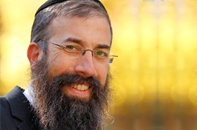
A Word From The Rabbi
Dear Friend,
The Torah portion of Devarim (the first portion in the book of the Torah known as Deuteronomy) is always read on Shabbat Chazon (literally "The Sabbath of Vision"), the Shabbat before Tisha B'Av - the ninth day of the Hebrew month of Av. As nothing in Judaism is coincidental, the Torah portion of Devarim and Shabbat Chazon must be interconnected.
The Book of Deuteronomy is unique in that, unlike the first four Books of the Torah, it was transmitted by Moses to the generation of Jews that was about to enter the Land of Israel.
The generation of Jews that wandered through the desert is known as "the generation of knowledge." Because they occupied such a high spiritual level, commensurate with Moses', they merited to lead a completely spiritual existence. The generation that entered Israel, by contrast, began a whole new chapter in Jewish history. Because they had to involve themselves in more mundane affairs, their spiritual level is considered to be lower than that of the generation that preceded them.
Nonetheless, it was precisely the generation that entered Israel that was able to successfully fulfill G‑d's plan. G‑d wants us to serve Him within the context of the material world, establishing a "dwelling place" for Him in the "lower realms."
Accordingly, although the Jews who entered Israel were spiritually inferior in comparison with their parents, they possessed a certain advantage over their elders: The Jews who entered Israel merited to attain a level of "peace and security" that was denied the previous generation.
Shabbat Devarim is thus a resolution of two opposites. On the one hand, the Jews' entry into the Land of Israel was a very great descent, for it signified the need for daily contact with worldly matters. On the other hand, it was precisely by means of this descent that they were able to attain the highest ascent of all: the fulfillment of G‑d's plan.
Likewise, Shabbat Chazon is a study in contradiction. Shabbat Chazon occurs in the middle of the Nine Days, a period in which we mourn the destruction of the Holy Temple. Yet, at the same time, as the famous Rabbi Levi Yitzchak of Berditchev explained, on Shabbat Chazon every Jew is shown a vision of the Third Holy Temple, an edifice that will be infinitely superior to the two Holy Temples that preceded it.
Thus Shabbat Chazon expresses the same theme of descent for the purpose of ascent as Devarim: It is precisely through the descent which caused the Temple's destruction in the first place that we will achieve the highest ascent of all: the establishment of the Third Holy Temple by Moshiach, may it happen at once.
Wishing you a successful week,

Rabbi Yudy Shemtov
Senior Rabbi/Executive Director

